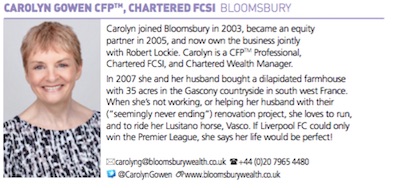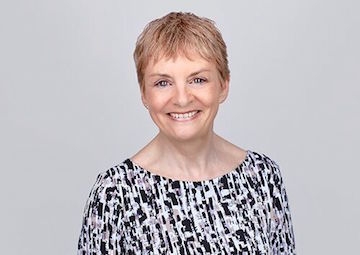Carolyn Gowen CFPTM Chartered FCSI reveals how she achieved her dream of a life in France while still managing to help run a Financial Planning business in England.
How did you get into Financial Planning and what attracted you to the profession?
Carolyn Gowen CFPTM, Chartered FCSI: By accident! I answered an advert in the Bristol Evening Post in May 1987, which asked ‘do you want to learn about unit trusts?’ I had no idea what a unit trust was. The firm was a small IFA called Hargreaves Lansdown. I joined as a life and pensions administrator and the rest, as they say, is history.
When was your firm set up and who started it?
CG: The original firm, Bloomsbury Financial Planning, was set up by Jason Butler CFPTM Chartered FCSI in 1998 and was sold to Destini (subsequently acquired by Axa) in 2003. The present firm arose as a result of a management buyout from Destini in 2004 by Jason, Robert Lockie CFPTM Chartered FCSI, Campbell Edgar Chartered MCSI and me. Campbell left the firm a few years later and Robert and I purchased Jason Butler’s stake in September 2015; we now own the business equally.
What sort of a company is it and what services does it offer? Does it specialise in particular clients or services?
CG: We work closely with successful business people, their life partners and families to overcome the challenges involved in managing complex affairs and significant wealth. We provide comprehensive Financial Planning with discretionary portfolio management (where there are assets to manage).
What has Accredited status brought to your firm and why should others seek to obtain the accolade?
CG: Achieving Accredited Financial Planning FirmTM accreditation has provided Bloomsbury with a clear means of being distinct from other firms in the wealth management field. As it is only available for firms offering full Financial Planning, which is at the heart of the service we offer, it allows potential clients and our professional connections to identify us immediately as a firm adopting the highest standards of professionalism and service in Financial Planning.
I can only imagine that any Financial Planning firm would want to achieve that level of distinction to strengthen tangibly their brand and their offering. Achieving Accredited Financial Planning FirmTM status is a no brainer for seriously ambitious Financial Planning operations as it demonstrates that the firm actually applies both planning and a consistent investment philosophy rather than potentially comprising a group of highly qualified individuals who might deliver wildly differing levels of service according to which of them the client engages.
How many clients do you have and what’s the annual turnover? Do you have a target for next year?
CG: We look after 62 client families. Turnover for 2015/16 was £1.27m. Targeted turnover for 2016/17 is £1.4m. Our ten-year business plan is built on steady organic growth, with target EBITDA of 30 per cent.
How many planners, Paraplanners and other staff do you have?
CG: Four planners: two directors/owners who are planners and two wealth planning managers; Two wealth planning assistants; We have one of each of these roles: operation admin, marketing manager, marketing assistant, office manager, bookkeeper. We outsource the FD function. We are planning to recruit a further WPA trainee in the autumn.
Can you tell us about your move eight years ago to France. What inspired it? How do you balance your life there and working in England?
CG: The move was inspired by a lifelong love of France and made possible thanks to advances in technology.
We had always planned to retire to France but a combination of the availability of high- speed broadband and the business plan of Michael O’Leary meant we could achieve our dream much earlier than planned so in July 2007 we packed up ourselves, two dogs and 100 sheep and goats and made the move (we have since added numerous cats and three donkeys to our menagerie). It’s without doubt the best life decision I ever made.
I generally spend one week per month in the UK office and work from home the rest of the time. If I need to make ad-hoc visits to the office for client or other meetings, I can. Travelling times are such that I can actually make the trip over and back home in one day. I probably end up working longer hours than I would do if I was in the office every day, as with no commute to think about there is always the temptation to ‘just get that done’ before finishing up for the day. That said, I try and break up the day with running and/or riding to compensate for that.
What has been your greatest source of achievement so far in running your business and what are you proudest of?
CG: Building a business which provides huge job satisfaction for me, employment for others, and a service to our clients which is second to none is certainly what I’m most proud of. I think up there among my greatest sources of achievement would be (with Robert) success- fully managing Jason’s exit from the business last year and negotiating the purchase of his shareholding.
I think it would be fair to say that there are many whose perception was probably that Bloomsbury was Jason – although our clients have always known that’s never been the case; it’s always been very much a team effort. The support we have had from the staff and our clients has been tremendous and we’re now seeing tangible results of that support, with referrals from clients and COIs at higher levels than they have ever been.
What has been the biggest hurdle or challenge to overcome for you personally in your career and for the company itself?
CG: Juggling the everyday demands of the business for a prolonged period while negotiating and concluding the deal. Although this wasn’t completed until early September 2015, Jason was on sabbatical from February last year. As anyone who has been through that process can tell you it’s an enormous time suck even when there are no outside parties involved. It was also an understandably unsettling period for the staff, and I can’t praise them highly enough for the way they supported Rob and me throughout that time.
What are the 3 things that keep you awake at night?
CG: Nothing keeps me awake at night!
What have been the key lessons you’ve learned at your current firm?
CG: I’ve learned that being in business with people is like a marriage – it requires compromise on all sides to make it work. Once you get to the point where, despite everyone’s best efforts and intentions, you’re no longer all pulling in the same direction, you have to agree to call it a day and part as amicably as possible. I’ve also learned that there is no external market for a minority shareholding in a Financial Planning business – so having a succession plan in place is vital. I’m not sure I’m in any position to be offering tips to others, but my personal mantras would be:
1. Always, always, no matter the cost to your business, put the client first.
2. Be an effective leader of your team
3. It’s all about relationships
What do you think of ‘robo-advice’?
CG: A positive innovation. I believe this will lead to more efficient back office tools becoming available to planners. I can’t see us ever incorporating automated advice into our service but we are always seeking ways to automate the delivery of some aspects of the wealth management service we offer to free up more time for us to spend on the parts of our service which our clients value most highly.
What is the biggest challenge for you in terms of the FCA and regulation in more general terms?
CG: We really don’t have any challenges on this score. We’ve built our business and the processes within it to ensure that we work compliantly and reduce the risk of errors. Human error is always a possibility and is always likely to be the biggest risk to our business, which is why we have robust processes in place to minimise that risk as much as possible.
How have you been affected by the hike in the FSCS levy?
CG: We are regulated as a branch of Raymond James, and as discretionary managers the FSCS levy hasn’t affected us in recent years. I don’t see how a system which penalises the good to pay for the sins of the bad is sustainable in the long term. A more equitable way of funding this may be some sort of levy along the lines of the ‘airport tax’ so that the cost is spread more widely.
FAMR has proposed re-defining advice. In 80 words or less what are your own definitions of A) financial advice B) Financial Planning?
CG: A) looks at elements of a client’s situation in isolation. Does not incorporate cashflow modelling or linking goals to resources available B) looks at a client’s situation holistically. Incorporates cashflow modelling and links goals to resources available to achieve them
What do you think the key is to making more of the general public aware of the benefits of managing their finances through a Financial Planner?
CG: Financial education, at grass roots level - in other words, as part of the school curriculum.
What’s the best thing about being a Financial Planner?
CG: Helping clients to live their dreams.
What do you like doing in your spare time outside of work? Do you have any unusual hobbies?
CG: I run, I read a lot, and I spend as much time as I can riding my horse, Vasco.
Key Points
1 – Share your business plan with your team and make sure your employees’ goals in their personal development plans relate directly to your business goals so that everyone can clearly see the impact their work has on the success of the business as a whole.
2 – Delegate, delegate, delegate.
3 - You can’t manage what you can’t measure. Make sure you are gathering the right MI data to root out inefficiencies and ineffective working practices
My business day:
07.00 - Feed horses
07.30 - Check emails
08.00 - Client work (could be peer review, portfolio management work, client call)
09.00 - Writing (blog, article for outside publication)
10.30 - Go for a run
11.30 - Check emails
12.00 - Lunch
12.30 - Client work (as above)
13.30 - One on Ones with team (each team member I manage has weekly with me)
16.00 - Client work (as above) 16.30 - Check emails
17.00 - Time with horses (riding, groundwork, feeding)
18.00 - Reading (business books, online articles, research)
18.30 - Finish (I am one hour ahead of the UK – these timings are UK times)


